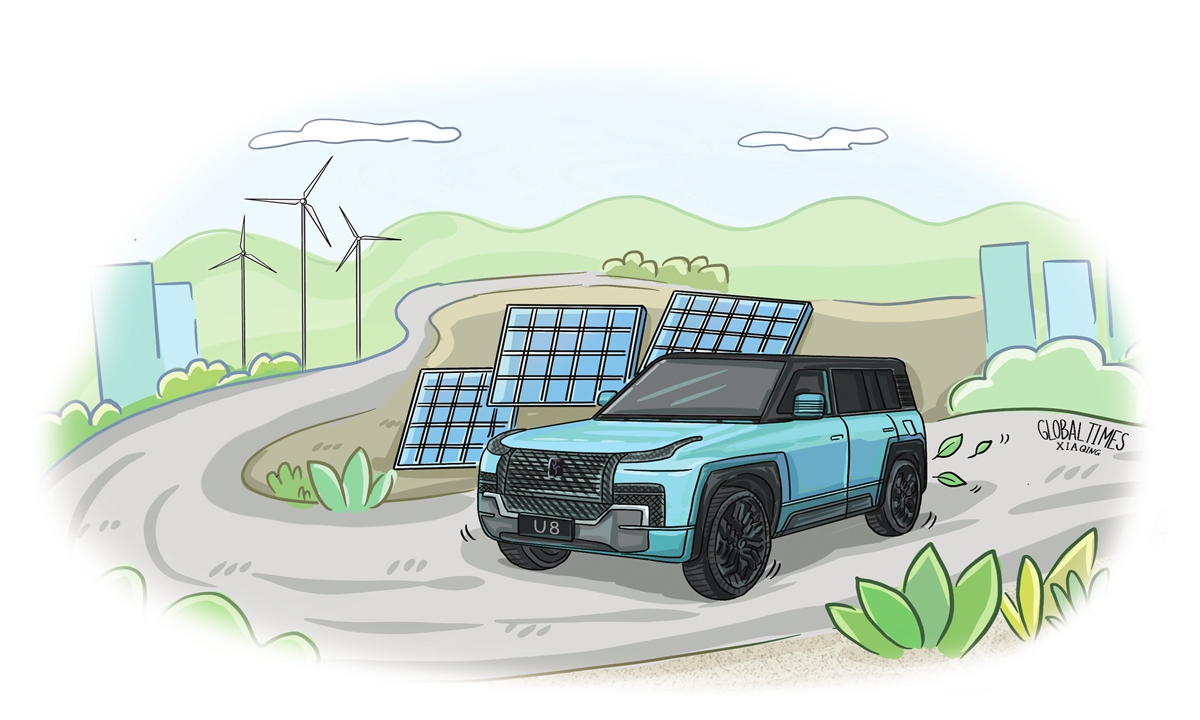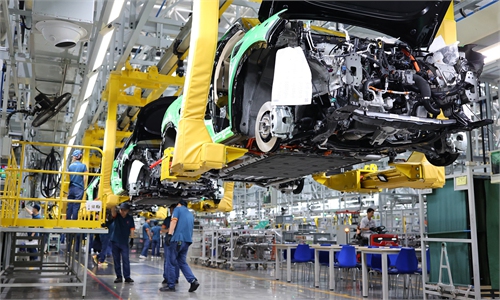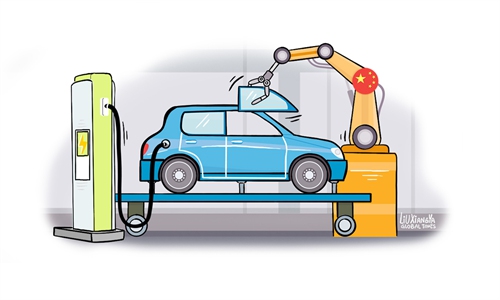China, led by intensive tech innovation, replaces Japan to become top auto exporter

Illustration: Xia Qing/Global Times
The world's automobile industry is witnessing a fast transformation, from principally manufacturing and assembling in the past to become a technology-intensive industry, led by electrification, internet connectivity, autonomous driving and intelligence, like in-vehicle infotainment system.
A recent research report by Canalys, an international analytics organization, predicts the growth trend of China's automobile exports will stay strong in the coming several years, as there is a substantial demand for Chinese-made tech-studded electric cars in overseas markets. From January to September, Chinese auto manufacturers sold 3.4 million vehicles overseas, exceeding Japan and Germany which exported 3.2 million and 2.4 million vehicles respectively during the same period.
Of the 3.4 million exported Chinese vehicles, electric vehicles (EV) account for approximately 26 percent, more than double last year's share. China surpassed Germany in automobile exports in 2022, and will surpass Japan to become the world's largest auto exporter in 2023. In 2022, China produced some 60 percent of the world's EVs, both battery powered and plug-in hybrid vehicles. In 2023, China's EV production is expected to reach 8.6 million units.
The fact China has become the world's largest car producer as well as exporter is becoming an increasingly undeniable fact, which will be reinforced by Chinese enterprises' unrelenting and collective efforts at automobile electrification, high-speed mobile internet connectivity, autonomous driving endeavors and other industry-leading tech innovations.
International carmakers and vast consumers are either surprised or wowed by China's far-sight and audacity in reshaping the important auto sector by ferreting out traditional gasoline-fired vehicles which emit huge amounts of carbon dioxide and cause global warming.
The penetration rate of electric vehicle sales in the Chinese market has now neared 38 percent, which is forecast to reach 50 percent by the end of 2025. And, Chinese enterprises' dominance in producing car batteries - led by CATL, BYD and EVE Power - means China will likely account for more than two thirds of global battery production by 2030.
With strong support from the government, abundant engineering talent, a growing flair for innovation, a massive domestic market and the public's broad support for de-carbonization and green commute and travel, Chinese carmakers own a considerable window of opportunity to take the leading role in auto sector explorations and becoming the world's dominant producer of highly-efficient and technology-studded clean cars.
Canalys estimates the export volume of Chinese-made vehicles to reach 5.4 million units this year, with EVs taking up 40 percent to reach at least 2.2 million units. Underpinned by product and innovational advantages and driven by growing investments of Chinese carmakers in research and development, and Chinese companies' localization efforts in other markets, EVs will continue to be the core driver of China's manufacturing sector growth.
However, most overseas markets are still in the initial phases of the EV transition, with consumer demand starting to tick up. The export destinations have gradually grown to encompass Southeast Asia, Europe, the Middle East, Latin America and other regions. Data shows that Chinese brands accounted for 8 percent of the EU's electric vehicle market last year, and the proportion is expected to increase to 15 percent by 2025. Notably, BYD is now Southeast Asia's best-selling EV brand, holding some 40 percent of the EV market share in the region.
The world's automotive industry is facing the most significant transformation in its history, as the replacement of the traditional internal combustion engines with green, energy-saving and environmentally friendly electric batteries are now gaining pace. Whoever sets up a solid foundation in EV manufacturing technology and a well-developed supply chain will likely occupy the next highland in next-phase economic competition.
China's auto sector has benefited greatly from the government's strategic vision and Chinese entrepreneurs' first-mover advantages gained through investing early and heavily in battery technology research, upstream minerals mining and refining, and broad advances in mobile 5G telecom networks and in-vehicle software development. All this enables China to lead the global jostle for the EVs.
The reason why Chinese vehicles have become increasingly popular in overseas markets is their comparative advantages in electrification and digital intelligence. A recent report by international rating agency Moody's suggests that China's competitive advantage in lithium-ion battery production helps Chinese manufacturers reduce product costs.
The country now holds a prominent position in the electric-vehicle supply chain, with more than 500,000 EV-related enterprises scattered around the country, supporting three quarters of the world's battery production capacity. The battery is the single and most important component of the EV, accounting for some 40 percent of the vehicle's selling price. Also, China houses more than half of the world's processing and refining capability for lithium, cobalt and graphite, all essential materials for making batteries.
While China's massive market brings significant advantages to the development of its EV industry, the ever-bigger presence of China's new energy vehicles across the world testifies to the green transformation which China is leading the world. The global EV market scale is projected to grow threefold to reach $1.6 trillion by 2030 from $500 billion this year, growing at a compound annual rate of 18 percent through the current decade.
Taking a glance over China's home and overseas markets, BYD, GAC Aion, Li Auto, NIO, Chang'an and SAIC Wuling, together with Tesla, are the leading EV sellers. In 2022, BYD's global sales have surpassed Tesla to become the world's biggest EV maker. BYD takes advantage of in-house manufacturing depth, allowing for integrated solutions, including battery cell-to-body design and integrated power-electronics modules, as well as the low-cost Chinese supply chain. GAC Aion and Li Auto are catching up rapidly.
Just 15 years ago, China was still a "laggard in auto-making". In 2010, China's overseas vehicle sales "mostly involve low-tech trucks and buses", almost all shipped to other less-developed markets such as Africa, Eastern Europe and Central and South America where "the buyers are easy to please", a Western automotive industry journal reported. "Despite the hype and hoopla, hard evidence indicates homemade Chinese cars are not yet ready for major league export markets," the journal said.
But thanks to China's comprehensive supply chain advantages, lowing cost in logistics, labor and land use, China's EV manufacturers own a cost advantage of at least 20 percent compared to American and European carmakers. Currently, the country is already the world's largest automobile market, as well as the leading production and innovation hub for auto components and vehicles.
The green revolution is just unstoppable in order to achieve a sustainable development for the world. Carbon dioxide released from burning fossil fuels will rise by 1.1 percent this year compared with 2022, the Global Carbon Project announced at the ongoing global climate talks in Dubai, where leaders are reviewing progress toward the international goal of limiting global warming to 2 degrees Celsius above preindustrial temperatures.
The author is an editor with the Global Times. bizopinion@globaltimes.com.cn



